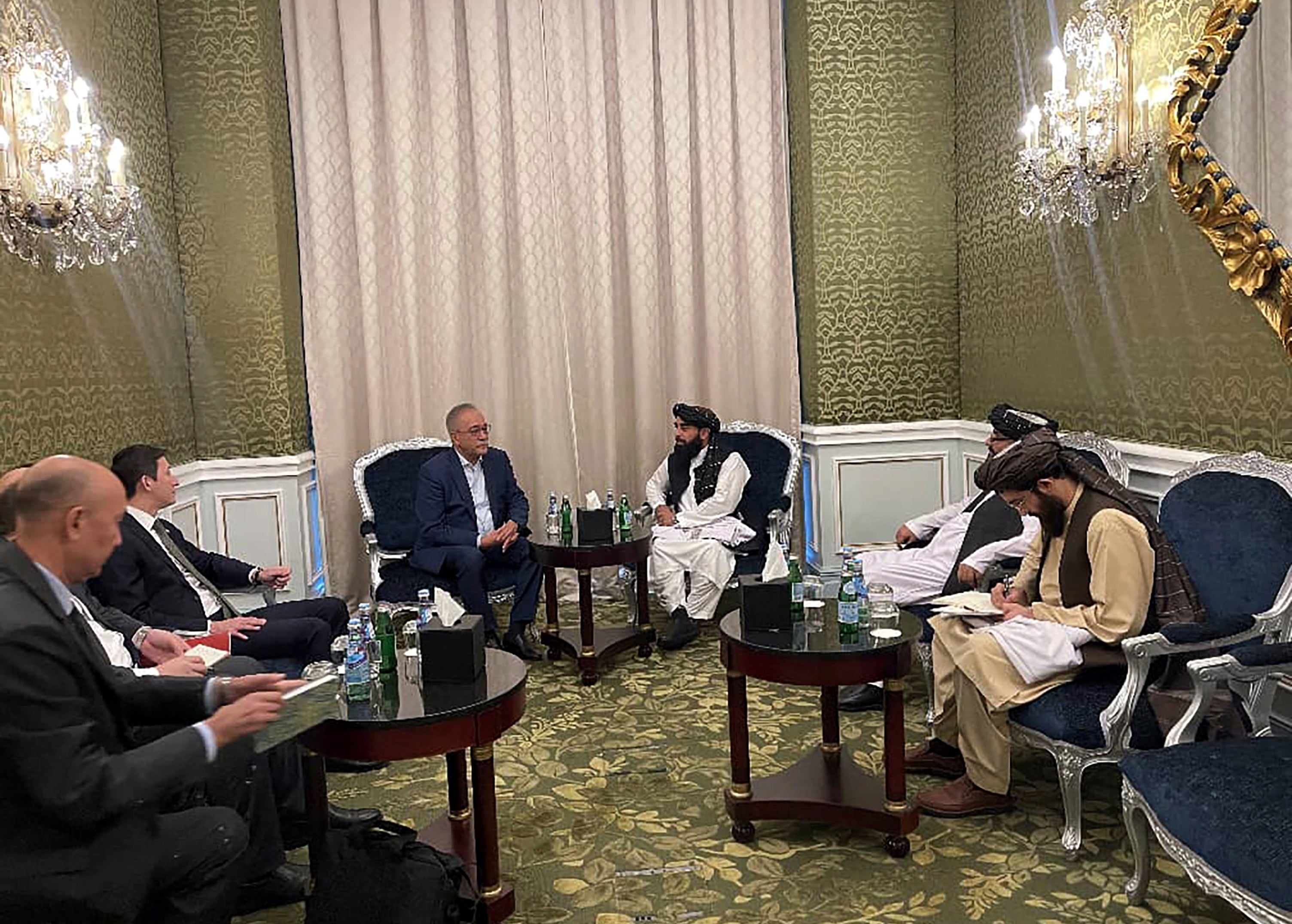The Taliban asked Western leaders to look past its harsh edicts on Afghan women, including banning them from education and working, as they reached Doha for the first ever dialogue with the international community on Sunday.
Amid mounting criticism of its exclusion of Afghan women at the talks, the Taliban urged that the harsh conditions it has set in the country be overlooked for the sake of improving foreign relations at the contentious UN-sponsored talks.
The Taliban has repeatedly ignored concerns of the international community about violations of human rights in Afghanistan, especially of women and minorities. It is seeking restoration of ties and economic status without allowing women to be a part of its economy.
Zabiullah Mujahid, the Taliban’s chief spokesperson, is leading the two-day talks in Qatar which the middle-eastern nation says is an “important opportunity for meaningful dialogue” to address the challenges gripping war-torn Afghanistan.
There has been widespread condemnation of the UN-led dialogue for eliminating the most affected part of the Afghan population under the hardline Islamist regime.
Mr Mujahid claimed that the Taliban is upholding certain religious and cultural values, along with public aspirations, that “must be acknowledged” to facilitate progressive bilateral relations instead of the disputes between the group and the international community.

Several women’s rights groups and activists condemned the talks.
Nobel Laureate Malala Yousafzai said she was “alarmed and disappointed” that the Taliban were invited to meet UN special envoys while Afghan women and rights defenders were excluded from the main conversation.
Convening the meeting without Afghan women sent “all the wrong” signals that the world was willing to accommodate the Taliban’s demands. She added that what the Taliban were doing in Afghanistan amounted to gender apartheid.
Rsearcher Farkhondeh Akbari said: “Doha III is diplomacy of gender apartheid. Discussing women’s rights under Taliban regime without the presence of women perpetuates the apartheid policies. It should never be repeated. Diplomats are aware of the problems with exclusion & should adopt a principled approach.”
“I do not deny that some countries may have problems with some measures of the Islamic Emirate,” Mr Mujahid said in his speech. “I think that policy differences amid states are natural, and it is the duty of experienced diplomats to find ways of interaction and understanding rather than confrontation.”
The Taliban’s rule in Afghanistan has erased nearly 50 million women from public spaces amid ban of girls and women from education, schools, colleges and workplaces. Women in the Taliban-ruled Afghanistan are not allowed to travel without a male guardian (mehram) such as a husband or a father.
Mr Mujahid insisted the Western leaders increase their engagement with the Taliban-ruled administration in Kabul and to have a more coordinated response to the country’s issue.
The Taliban’s caretaker regime has not been officially recognised by any country despite its multiple attempts. The UN has said the Taliban regime will remain unrecognised till its ban on female education and employment is not struck down.
Pointing to its growing ties in Central Asia, Mr Mujahid said the Taliban’s status as a prohibited group due its terrorist activities has already been removed by Kazakhstan. Its other ally Russia is set to follow the trend, he said and added that Saudi Arabia has expressed interest in reopening its embassy in Kabul.
He pushed for the economic sanctions by the West on the Taliban leaders to be removed and asked for the unfreezing of reserves worth billions in the country’s central bank. Stating the objectives from the Taliban’s side, he said: “First, the removal of all restrictions and sanctions, as well as the annulment of previous resolutions that have created significant barriers for Afghanistan’s private sector.”
“Second, the unfreezing of all foreign reserves of Da Afghanistan Bank, which are the legitimate property of the Afghan people,” he said. The total international reserves in the Afghan central bank are estimated to be around $9.5bn (£7.5bn), according to a June 2021 DAB financial statement.
The ultra fundamentalists, who took over Kabul from US and Nato forces in August 2021, has rejected criticism of their treatment of Afghan women and girls, calling it interference. It had initially claimed to rule Afghanistan with a moderate rule but has repeated its diktats from the 1990s, including a ban on women from entering salons, national parks, public spaces and gyms.
This was the third such UN-sponsored gathering in Doha on the way forward for Afghanistan, which has been battered by unprecedented floods and droughts on top of an economic crisis and humanitarian crisis. Afghan women and children have been worst hit in multiple floods, droughts and earthquakes as they have remained indoors.
In the last such discussion in February this year, the Taliban pulled out at the last minute citing the presence of civil rights groups in the talks. They were not invited to the first meeting.
Last week, the UN’s top official, Roza Otubayeva, said that the country’s needs economically need to be met and the talks will not fail to include Afghan women as the delegates will remind the Taliban to include them at the table. She insisted that demands for women’s rights are certain to be raised.
Activists said women have been excluded due to the Taliban’s preconditions.
“Not a single woman will be present during the Doha talks between the UN and Taliban. Without a doubt, the erasure of Afghan women and girls is the most pressing issue the country faces. To ignore this, and appease the Taliban as they wish, undermines the entire UN system,” said Sara Wahedi, an Afghan-Canadian entrepreneur.
“I should add that the Taliban has explicitly said that even the mention of the topic of women will result in them walking out of talks,” she said on X.








